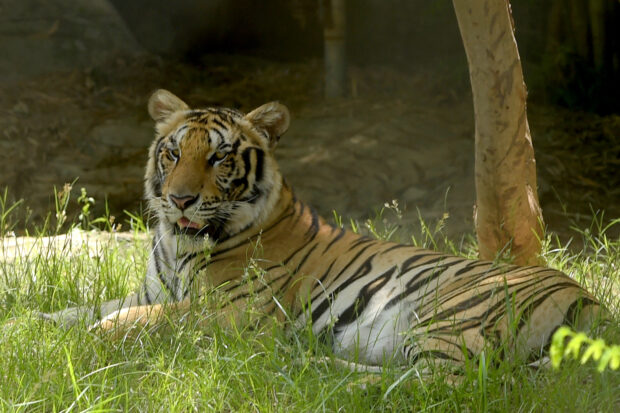Cambodia looks to import Indian tigers to revive big cat population

A tiger rests in an enclosure during the inauguration of Phnom Penh Safari in Phnom Penh on June 23, 2018. Cambodia hopes to import four tigers from India this year under an agreement signed with New Delhi aimed at reviving the population of big cats in the kingdom, an environmental official said February 19, 2024. AFP FILE PHOTO
PHNOM PENH — Cambodia hopes to import four tigers from India this year under an agreement signed with New Delhi aimed at reviving the population of big cats in the kingdom, an environmental official said Monday.
Cambodia’s dry forests were once home to scores of Indochinese tigers but conservationists say intensive poaching of both tigers and their prey has devastated their numbers.
The last sighting of a tiger in the Southeast Asian kingdom was from a camera trap in 2007 and the cats were declared “functionally extinct” in Cambodia in 2016.
READ: Cambodia to repopulate forests with tigers from abroad
One male and three female tigers “could arrive in Cambodia at the end of 2024”, Khvay Atitya, spokesman for the environment ministry, told AFP.
Article continues after this advertisementThe cats will be sent to a 90-hectare (222-acre) forest inside the Tatai Wildlife Sanctuary in western Koh Kong province to acclimatise before being released into the wild, he said.
Article continues after this advertisementHe did not give details about what type of tiger would be imported from India.
Officials this week began installing more than 400 cameras at one-kilometre intervals in the reserve in the Cardamom Mountains to monitor wildlife, particularly animals that tigers prey upon such as deer and boar, he said.
The information from the cameras “will help with breeding of tigers”, Khvay Atitya said.
Twelve more tigers will be imported over the next five years if the project goes smoothly, he said.
READ: World tiger population grows but SE Asia threats ‘critical’ — WWF
Deforestation and poaching have devastated tiger numbers across Asia.
Cambodia, Laos and Vietnam have all lost their native populations, while Myanmar is thought to have just 23 tigers left in the wild.
Cambodia and India signed a memorandum of understanding in 2022 on restoring tigers and their habitats.
India’s wild tiger population was estimated to have exceeded 3,600, according to government figures released last year, following a massive conservation campaign.